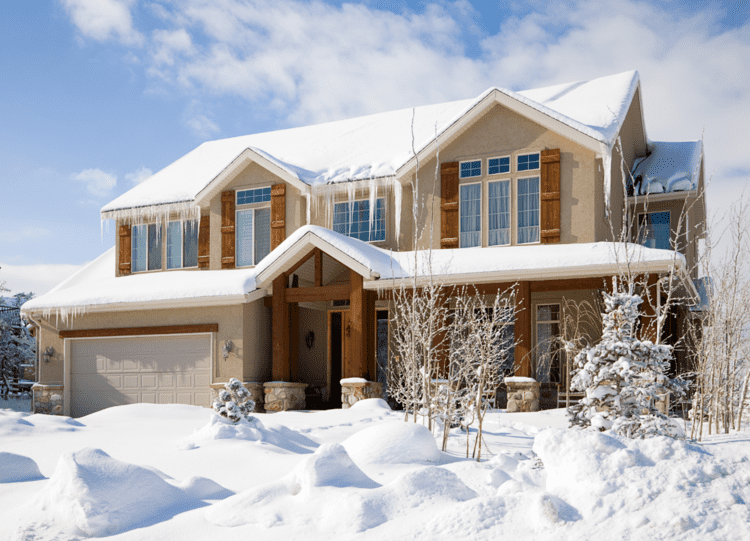
The wild winter season can wreak havoc on your home… even without a fierce winter storm. All it takes is dropping temps and unlucky circumstances to turn a cozy night by the fire into your worst nightmare.
Here are the most common challenges homeowners face during the winter season:
- Frozen pipes
- Ice dams
- Heavy snow on your roof
- Slips and falls
- Power outages
- Tree damage
Your homeowner’s insurance can help with some of these issues when they happen, but the best remedy is to avoid these incidents altogether. Here’s what you can do to keep the lights on, the pipes warm, and your winter nights serene:
How to Prevent Frozen Pipes
What’s the big deal about frozen pipes? When pipes freeze, they can burst, leading to massive water damage that can cost you thousands of dollars and days of headaches. Your homeowner’s insurance likely covers water damage from burst pipes, but check your policy and follow-up with your local Wichert agent to confirm.
The best way to prevent your pipes from freezing is to:
- Insulate your pipes in areas where the heat doesn’t reach
- Let your faucets drip during extremely cold nights so that the water keeps moving (running water is less likely to freeze)
- Keep your thermostat set to a consistent temperature, even when you’re out of town
How to Prevent Ice Dams on Your Roof
An ice dam can form on your roof when snow accumulates and heat leaks from the interior of your home, causing the roof to warm and the snow there to melt from the underside of the snow.
The melted snow flows down the roof and refreezes when it reaches the colder eaves, forming a layer of ice along the roof’s edge. As this process repeats itself, more and more ice builds up, which can lead to potential damage to your roof and water leakage into the interior of your home.
Homeowner’s insurance might cover this damage, but to prevent these issues in the first place, follow these tips:
- Keep your gutters clean to avoid water backup
- Use a roof rake to remove snow from your roof
- Check to make sure your attic is properly insulated and ventilated
Heavy Snow Can Lead to Structural Damage
Your roof protects everything you care about inside your home. It bears a lot of weight, but even the best roofs can struggle under the weight of lots of snow.
The snow load on your roof can lead to structural damage to your home, and your homeowner’s insurance policy likely covers damage from all of that weight, but again, prevention is essential:
- Remove excess snow from your roof or call a professional to help
- Ensure proper insulation in your attic to prevent uneven melting and refreezing
Icy Sidewalks Can Lead to Slips and Falls
Neighbors, visitors, and especially your mail carrier will certainly appreciate it if you keep your sidewalks and driveway clear of ice!
If your homeowner’s insurance includes liability coverage, it may provide protection if someone slips and falls as a result of ice on your property.
- Use ice melt or sand to improve traction on your walkways and driveways
- Regularly clear these paths during snowstorms to make removal easier
Longer Power Outages During Winter Storms Can Cause Problems
A power outage can make for a memorable evening gathered around candles and board games, but the fun only lasts a few hours. Wide-reaching outages during storms could take days to remedy, which can be both unpleasant for your family and potentially cause damage to your property.
Most homeowner’s policies won’t cover losses like spoiled food due to power outages, but they may cover damages caused by power surges.
To prevent damage to your home and prepare for potential winter outages:
- Install surge protectors for electronic devices
- Have a generator or alternative heat source on your property
Trees Don’t Like Winter Storms Either
Trees can withstand some abrasive winter weather conditions, but accumulated heavy snow and ice can cause some trees to fall, and which direction they land can be the difference between a sigh of relief and a gasp.
Coverages vary, so check with your local Wichert agent to see if your homeowner’s insurance covers damage caused by fallen trees.
You can prevent damage to the buildings on your property by:
- Trimming branches that are close to your home
- Removing dead or dying trees before winter begins
If you’re uncertain whether your homeowner’s insurance policy protects you and your property from these common winter weather concerns, connect with your local Wichert agent today. Wichert Insurance delivers tailored, personalized insurance coverage plans that are priced to meet your budget and family’s needs. Browse all of our personal insurance products, or call us at 800-888-0979 to connect to a local agent.
